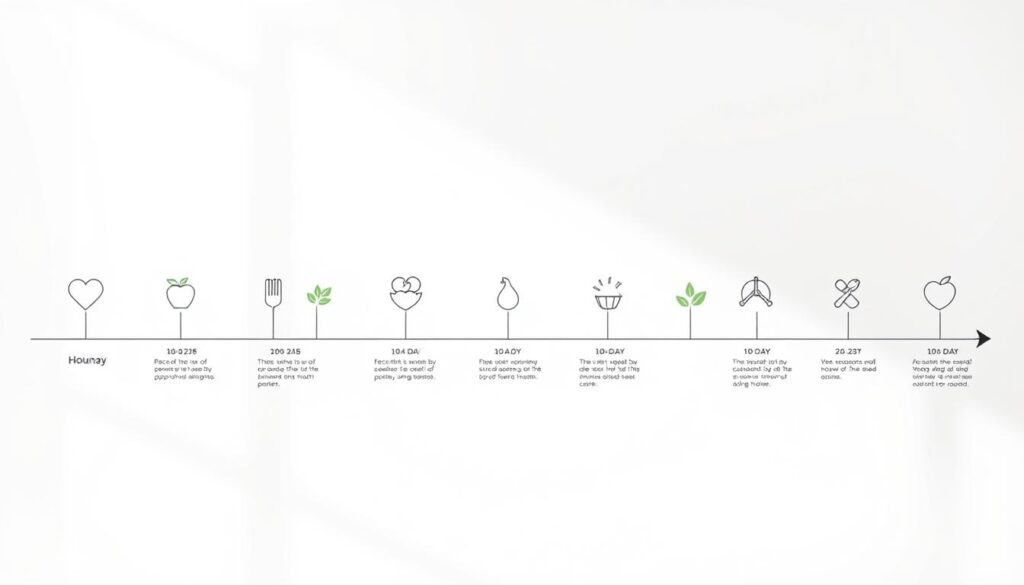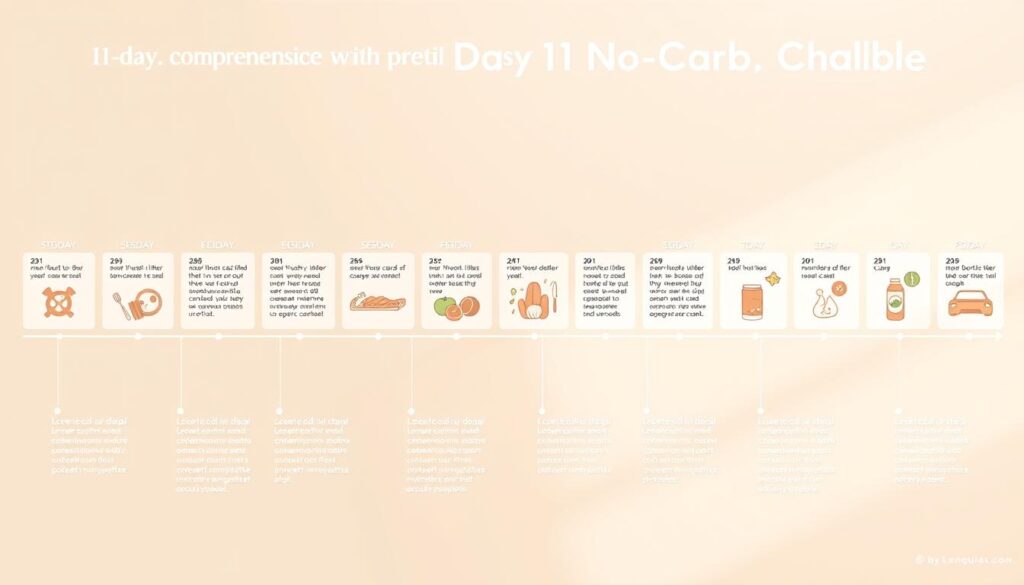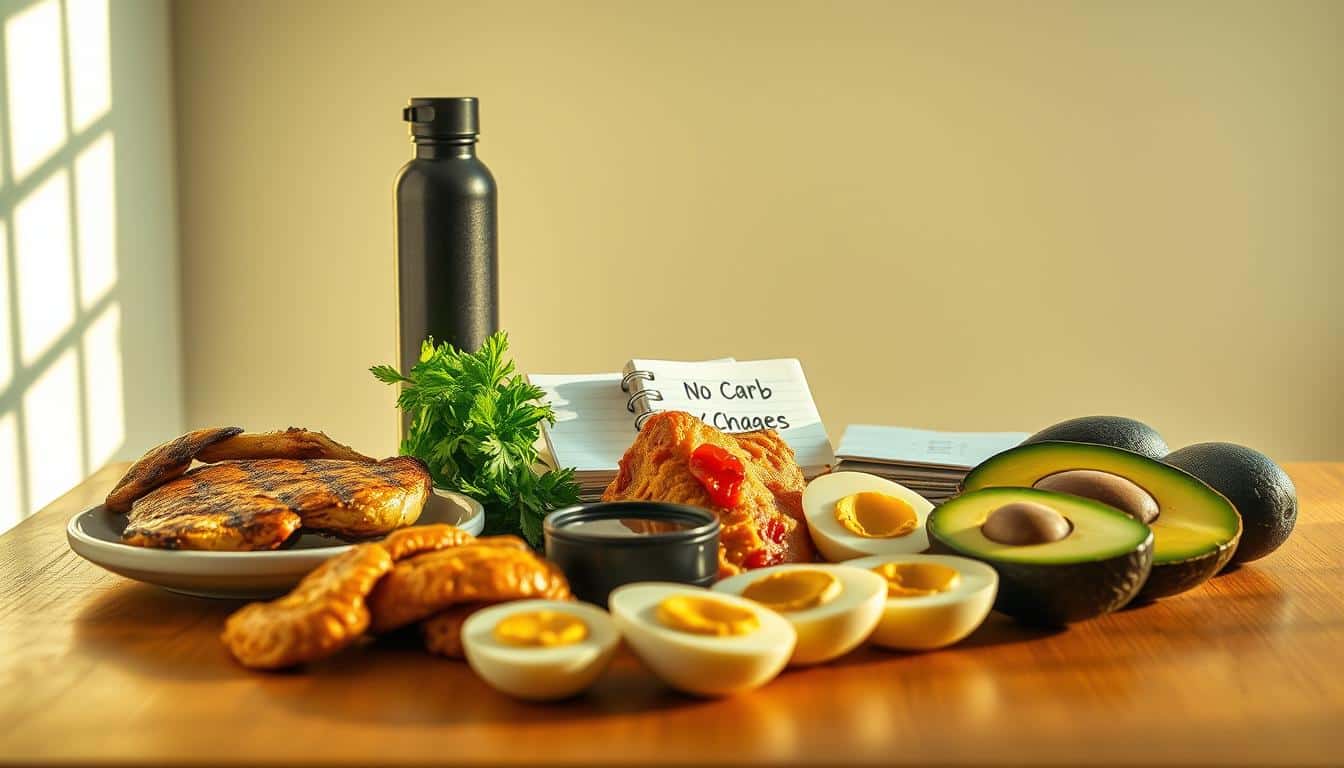The 11 day no carb challenge is a focused plan to reset your diet. It explores the benefits of cutting carbs. This structured approach helps you track progress and aim for weight loss goals.
Over 11 days, you’ll learn to replace high-carb foods with nutrient-rich alternatives. This fosters mindful eating habits.
By cutting carbs for 11 days, you’ll see how it affects your energy and metabolism. The challenge gives clear guidelines on what to eat and avoid. It’s based on nutritional science.
It’s designed for those looking for a short-term strategy to start healthier choices. You won’t have to stick to it long-term.
Participants may notice changes in appetite or energy at first. But the plan includes strategies to stay on track. It focuses on small wins, making it accessible for beginners and experienced dieters alike.
Understanding the 11 Day No Carb Challenge
The 11 day no carb challenge aims to reset your eating habits by cutting out carbs. It’s a short-term plan to see how different foods affect your energy and cravings. Let’s explore its main ideas.
What Defines a No-Carb Diet?
A no-carb diet means eating foods with less than 5g of net carbs each day. You’ll avoid grains, sugars, and most starchy veggies. Instead, you can eat leafy greens, meats, and some cheeses. Here are the main rules:
- Avoid bread, pasta, fruits, and beans
- Focus on proteins and healthy fats
- Track hidden carbs in processed foods
Science of Short-Term Elimination
When carbs are removed, your body changes quickly. Your insulin levels go down, which helps with fat storage. Your liver then turns fat into ketones for energy, a state called ketosis.
This shift can help burn more fat and make you feel less hungry.
Comparing to Keto and Low-Carb
The 11 day no carb challenge is different from keto diets and traditional low-carb diets. Keto diets allow more fats over time. Low-carb diets let you have 50-100g of carbs each day. The 11-day plan is shorter and stricter, aiming for a quick reset, not long-term ketosis. Here’s what sets them apart:
- Duration: 11 days vs. months/years
- Carb limits:
- Purpose: Temporary reset vs. lifestyle change
Why Consider Eliminating Carbs for 11 Days
The 11 day no carb challenge benefits go beyond quick weight loss. Many find they have more energy and feel less hungry. This short-term no carb diet helps change how we eat, making it easier to see how food affects us.
- Carb elimination advantages include lower inflammation markers, as noted in studies on short-term low-carb interventions.
- Reduced insulin spikes may aid in identifying personal sensitivities to carbohydrates.
- Participants often report clarity in distinguishing natural hunger from habitual snacking.
While the 11 day no carb challenge benefits are appealing, results can differ. Some feel tired in the first 48 hours as their body adjusts. Athletes or those with thyroid issues should talk to a doctor first. The aim isn’t to avoid carbs forever but to learn how they affect us. Eleven days provide a safe space to see these effects without long-term rules.
Preparing Your Body and Mind for the Challenge
Success begins with good preparation. To get ready for the 11 day no carb challenge, you need to be physically and mentally prepared. Also, make sure your kitchen is stocked with the right foods.
Physical Preparation Steps
Start by changing your diet:
- Slowly cut down on carbs 3–5 days before to avoid withdrawal.
- Drink plenty of water and electrolyte drinks like Nuun Electrolytes to stay energized.
- Switch to light exercises, like yoga or walking, to avoid getting too tired.
Mental Strategies for Success
Stay focused with these tips:
- Use apps like MyFitnessPal to track your progress and stay on track.
- Plan activities to distract yourself from cravings, like reading or going for a walk.
- Imagine yourself succeeding every day to keep your commitment to the no carb diet preparation strong.
Kitchen and Pantry Organization
Get your kitchen ready for success:
- Get rid of all bread, cereals, and sugary snacks.
- Fill your pantry with healthy foods like leafy greens, grass-fed meats, and healthy fats like chia seeds.
- Prepare meals in advance and have emergency snacks like Quest Bars or Garden of Life shakes ready for carb detox readiness.
Potential Health Benefits You May Experience

Many people see 11 day no carb challenge results in the first week. They notice less sugar craving as their body starts to burn fat. They also see better blood sugar levels, showing the no carb diet effects on glucose.
These changes are similar to what studies show about carb elimination benefits. They talk about better insulin sensitivity. This is good for your health.
- Steadier energy levels replacing carb-induced crashes
- Weight reduction from reduced glycogen and water retention
- Improved focus due to stabilized blood sugar patterns
- Lower inflammation markers noted in lab work for some users
| Days | Common Experiences | Possible Mechanisms |
|---|---|---|
| 1-3 | Reduced hunger pangs | Lower ghrelin production |
| 4-7 | Sharper mental clarity | Ketone production for brain fuel |
| 8-11 | Stable energy throughout day | Metabolic adaptation to fat utilization |
Studies show cutting carbs can lower fasting insulin by 30% in two weeks. But, how much you benefit can vary. You might also notice better digestion as your gut changes.
Always talk to a doctor before changing your diet. This ensures you’re safe and can track your progress well.
Managing Common Side Effects and Challenges
Starting the 11-day no-carb challenge can be tough. You might face physical and emotional challenges. This section offers tips to handle the 11 day no carb challenge side effects and stay focused on your goals.
Dealing with Carb Withdrawal Symptoms
The first days can be tough, with headaches, brain fog, or feeling irritable. These symptoms usually go away in 3-5 days as your body adjusts. Here’s what you can do:
- Drink broth or electrolyte drinks to replace lost sodium and potassium.
- Rest more; you’ll feel tired the most in the first 48 hours.
- Have nuts or jerky ready to stop cravings.
Overcoming Energy Dips and Mood Changes
Feeling tired or moody is normal when your body changes. Focus on:
- Drinking 8-10 cups of water a day.
- Getting 7-9 hours of sleep to help recover.
- Doing 10-minute breathing exercises to reduce stress.
Social Situations and Dining Out Strategies
It’s important to plan for social events. Look up restaurant menus online to find good choices. Say, “I’m eating high-protein this week—can you suggest a meat dish?” Carry snacks to avoid bad choices. Most no carb diet difficulties come from not being prepared, not lack of willpower.
Daily Breakdown of Your 11 Day No Carb Challenge
Understanding the 11 day no carb challenge timeline is key. It involves three no carb diet phases your body goes through. This journey resets your metabolism and clarifies your diet through careful steps.

Days 1-3: The Adjustment Phase
During these days, you might feel tired and crave carbs. Drink lots of water and eat protein-rich foods like grilled chicken or spinach salads. Keep a journal to track when you feel low in energy.
Days 4-7: Finding Your Rhythm
By now, your body starts using fat for energy. Try low-carb snacks like almonds and cucumber slices. Use this time to try new recipes.
Days 8-11: Maximizing Results
This is your last push to make lasting changes. Eat foods high in nutrients like broccoli, avocados, and wild-caught fish. Write down what works and what doesn’t to help after the challenge.
| Phase | Days | Key Focus | Strategies |
|---|---|---|---|
| Adjustment | 1-3 | Adaptation | Hydration, protein intake, journaling |
| Rhythm | 4-7 | Consistency | Snack planning, recipe testing |
| Maximization | 8-11 | Optimization | Nutrient prioritization, habit tracking |
Exercise Recommendations During Carb Restriction
Following the 11 day no carb challenge exercise plan means changing workouts to fit less carbs. The body starts using fat for energy. So, choose exercises that keep you fit without needing carbs.
Stick to moderate workouts like walking, yoga, or light weight training. High-intensity activities like sprinting or heavy lifting might feel tough at first. Here’s how to adjust:
| Exercise Type | Best For | Tips |
|---|---|---|
| Walking | Endurance maintenance | 30-minute sessions, focus on steady pace |
| Yoga | Mobility and recovery | Incorporate 2-3 times weekly |
| Resistance Training | Muscle preservation | Use lighter weights, higher reps (12-15) |
Staying hydrated and keeping electrolyte levels up is key when working out without carbs. Drink water with electrolyte supplements to avoid muscle cramps. Rest days are important—listen to your body. Try to get 7-8 hours of sleep each night to help your body recover.
Keep track of your progress with a journal. Note how you feel and how your workouts go. Most people find they can do more by day 8. Stay on track to reach your no carb diet fitness goals.
Transitioning Back to Normal Eating Post-Challenge
Finishing the 11-day no-carb challenge is just the start. The next step is after 11 day no carb challenge recovery and building lasting habits. A well-thought-out post no carb diet plan helps avoid setbacks and supports long-term health.
Begin by reintroducing carbs slowly to avoid stomach upset. Here’s a 3-day plan to follow:
- Day 1-2: Start with small amounts of low-glycemic carbs like berries or sweet potatoes.
- Day 3-4: Add moderate carbs like quinoa or legumes, watching how they affect your energy.
- Day 5+: Slowly add complex carbs, focusing on whole foods over processed ones.
Keep a journal to track how your body reacts to carb sensitivities. Note any bloating, fatigue, or cravings after trying new foods. You might find out which foods, like refined sugars or gluten, don’t agree with you.
Make a sustainable long-term plan based on what you learn. Here are some tips:
- Choose carb sources that give you energy without causing problems.
- Stay away from foods that trigger issues.
- Plan meals flexibly to keep things balanced without going too far.
Use what you’ve learned to create habits that fit your body’s needs. This thoughtful approach turns the challenge into a solid base for health, not just a quick fix.
Conclusion: Leveraging Your No-Carb Challenge Experience
Finishing the 11-day no-carb challenge shows how carbs affect our health. People often notice better mental clarity or less bloating. These signs show how carbs impact our energy and digestion.
Learning from the no-carb diet goes beyond the 11 days. Note how your body reacts to cutting out grains and sugars. Did you feel mood swings or cravings lessen? These signs help you make better food choices in the future.
Outcomes from the carb challenge vary, but it teaches us a lot. Some feel more energetic without sugar, while others crave carbs again after adding them back. Think about which foods kept you full and which made you crash. This helps you create a diet that fits your body’s needs.
Carbs aren’t bad; they help us move and think. The challenge helps us see the difference between good carbs (like whole grains) and bad ones (like processed sugars). Use this knowledge to make smart choices, not strict rules. Talking to a registered dietitian can help you turn short-term gains into lasting habits.
FAQ
What is the 11 day no carb challenge?
The 11 day no carb challenge is a diet plan. It lasts for eleven days and removes carbs from your diet. You eat proteins and healthy fats instead, aiming for weight loss and better health.
Who should consider the 11 day no carb challenge?
It’s good for those wanting to lose weight or cut down on sugar. But, people with diabetes or eating disorders should talk to a doctor first.
What types of food can I eat during the 11 day no carb challenge?
You can eat lean meats, fish, eggs, and healthy fats. Non-starchy veggies and some dairy are okay too. Stick to whole foods for the best nutrition.
Will I experience side effects during the challenge?
Yes, some people get “carb flu” symptoms like headaches and tiredness. These usually go away in a few days as your body adjusts.
How should I prepare for the 11 day no carb challenge?
Start by eating fewer carbs and drink more water. Change your exercise routine and clean your kitchen of carbs. Getting mentally ready is also important.
Can I exercise during the 11 day no carb challenge?
Yes, but you might need to adjust your workouts. Stick to low to moderate activities like walking or yoga. This helps your body use fat for energy.
What results can I expect after completing the challenge?
Many see weight loss, more energy, and clearer thinking. But, results vary based on your health and how well you stick to the challenge.
How can I transition back to a regular diet after the challenge?
Start with small amounts of carbs and watch how you feel. Gradually add more carbs as needed. Paying attention to your body helps with long-term eating habits.
Is the 11 day no carb challenge suitable for everyone?
It’s safe for many, but not everyone. If you have health concerns, talk to a doctor before starting.
How can I stay motivated during the 11 day no carb challenge?
Set goals, track your progress, and join groups for support. Remind yourself of the benefits you want. Writing about your experience can also keep you motivated.


